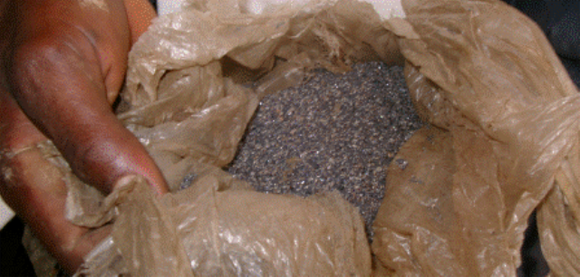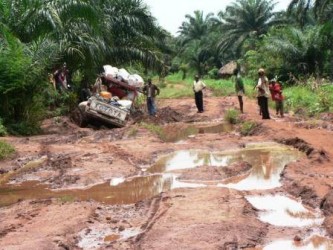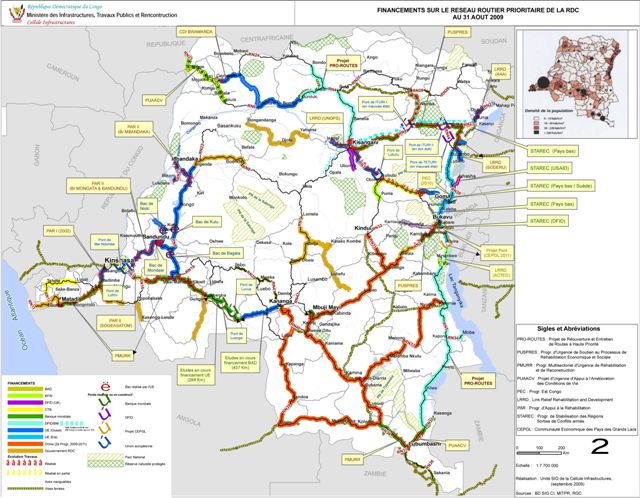Hello from Kinshasa – or, I should say, mboté or perhaps bonjour!
I have just moved to the Democratic Republic of Congo (DRC) to take up my new post as Infrastructure and Environment Adviser.
I have a fascinating and challenging three years ahead of me. DRC, a country of 67 million people, is 168th out of 169 in the latest rankings in the Human Development Index, which measures countries' levels of development. Life expectancy is just 48, and the average adult has had only 3.8 years of education. Civil wars since the late 1990s are thought to have led to the deaths of up to four million people – more than any war since World War II.

Yet there is reason for hope. DRC held democratic elections in 2006 for the first time in forty years. It has an incredible amount of mineral wealth, from gold to recently-found oil to coltan, the hugely valuable mineral used in mobile phones. And it has an abundance of natural resources, with almost half of Africa's forests and huge hydropower potential. If well managed, these natural attributes could be turned from fuel for war, to a huge force for good.
My role here will focus on helping DRC to build much-needed roads, provide water and sanitation to people, and ensure the country's unique environment is protected.

DRC is huge – as large as western Europe – but has just 2,000 km of useable, paved roads. To put that into context, the UK has 398,000 km. Yet roads are fundamental to security, prosperity and development. Roads offer access to markets in war-torn areas, providing an incentive to invest in peace. They allow people to reach much-needed health services, or to get to school. And they allow security services to establish rule of law.

So a number of my upcoming blogs will talk about the reasons DFID supports investments in roads, and the opportunities and risks of road-building. In other posts I'll take you through our work on water and sanitation, lack of access to which is one of the major health concerns facing DRC. I'll also talk about the environmental challenges faced by DRC and DFID's programmes, as well as the environmental and social risks that the work we do could entail if we don't manage them well.
I tried to kick off this introductory blog with the languages of my new country, but since my French and Lingala aren't yet quite up to scratch, I'll stick to English for my future posts. Until then: kendéke malámu, au revoir.

13 comments
Comment by Matt Jones posted on
What's it like being in Kinshasa when you don't speak French or a local language? Is it difficult to communicate on the streets or with colleagues or counterparts in the government? Do you go out on the street, or is it dangerous? Good luck in your new station!
Comment by Oliver Roper posted on
Hi Vicky
We have been involved in a number of projects in the DRC. Mostly rail related. In fact we still own some rolling stock!
Please view our website and if you so wish contact Bo Giersing who is our DRC specialist
Kind Regards
Oliver Roper
Comment by Bernard Obika posted on
I would be very interested to read further on the roads in the DRC. We at Roughton have assisted over 15 Africa countries in the development of low cost roads that aim to maintain all year accessibility. We do this by employing innovative roads technology some of which have been developed through DFID funded research work such as AFCAP which we are currently implementing in Tanzania. Working with DFID and others in Nepal and more recently in Nigeria and Botswana we piloted rural roads development schemes that aims to harness the considerable human resources of communities in maintaining their roads. I would be happy to share ideas on how these can be explored for the huge network of the DRC. Thank you Vicky for a very enlightening and interesting blog.
Comment by Vicky Seymour posted on
Thanks for your support, Matt. I was perhaps underplaying my proficiency in French! French is one of the official languages of DRC (with Lingala and Swahili) and it is therefore essential for us to speak and understand it in order to support our Congolese partners to deliver their development plans. All DFID staff get intensive French language training before taking up their post (unless they already speak sufficient French) and there is a teacher at the Embassy for ongoing tuition. My French is a little rusty, but definitely serviceable! I do have some way to go yet in my Lingala, though...
Comment by Saul Billingsley posted on
Hi Vicky - good luck with your new posting. I'll be interested to hear how you intend to prioritise safety in the roads you are building. Western donors and the development banks have a patchy record when it comes to ensuring that new roads are also safe roads, and we have been encouraging DFID to take road safety more seriously. WHO projections suggest that by 2030 road crashes will kill more people than HIV/AIDS. Road crashes are already the leading cause of death for young people aged 10-24 worldwide, and Africa has the most dangerous roads in the world - particularly those that have been recently paved. The UN is about to launch a 'Decade of Action', with a goal of stabilising and beginning to reduce global road deaths by 2020. UK was one of the co-sponsors. People like Jeffrey Sachs are saying that road safety has a role to play in delivering the MDGs - so I'd be interested to know how much of a priority this is for you?
Comment by Vicky Seymour posted on
Hi Saul
You're absolutely right to raise this important issue, and this is exactly the kind of thing DFID thinks through when it designs its programmes.
In DRC, there are so few paved roads that the roads whose construction we are supporting are not being rehabilitated to motorway or highway standard. The roads we are working on were unpaved before work began, and were built as single lane roads. They will therefore remain as single lane roads after rehabilitation, but will be widened every kilometre and in areas of restricted visibility like bends and slopes to allow trucks to pass each other. In urban areas and through villages, wider standards are used. And the road surface quality levels we are aiming for will allow an average speed of 40 kph - a fairly slow speed.
Nevertheless, you're right that there is a risk of increased numbers of road accidents, particularly where children have only ever been used to unpaved and perhaps unuseable roads. We have therefore built measures in to our programmes to improve road safety. These include placing speed barriers where they are needed, carrying out information campaigns to sensitise motorists and pedestrians to using roads, reducing speed with the use of speed signs, and reducing dust by planting vegetation barriers.
Ultimately, we believe the health benefits of building roads significantly outweigh the risks if they are carefully managed. When we designed our roads programmes, people told us that rehabilitation of roads was their first priority, and that roads would improve their health conditions. This is because roads provide access to health centres and health professionals that people were previously lacking.
Thanks again for your thoughts.
Vicky
Comment by Joy Mamikay Oche posted on
Hi Vicky,
Quite an interesting read.
I've never been to DRC but if I am to compare it to some rural areas in Nigeria, then you might want to consider the major modes of transportation (especially for school children) and communication.
It will be necessary to provide adequate lightning in the dark, for commuters.
It might be helpful to involve Community leaders, school teachers,local radio station(if there's any) and sponsor festivals/social events to promote your awareness campaigns.
I'm an Environmental Engineer currently offering technical support services in a Government parastatal, and I would be very happy to read more on your role to provide water and sanitation in DRC,plus Ecology related projects.I guess when you mentioned ensuring the country's unique environment is protected , you meant biodiversity inclusive?!
Are the indigenes involved in your projects as well?It'll definitely help you get things done quicker!
Good luck in your role.
Comment by Kawalya posted on
What a good blog Vicky! Thanks very very much for such commitment!
However, it looks like the UK gov't is willing to spend up to £198 million per year for 67 million people (http://www.dfid.gov.uk/drc), which is basically £3 per year per living human being in Congo. This presents you with such a great challenge and more so if you have to channel that money through the DRC government with the expectation of serious results!
Given your constraints, I would suggest you try and set up a few entities per year with a lifespan of 50 to 100 years: for example, you may set up a referral hospital in the first year, set up a few km of road in the second year, deliver few km of piped water in the third year, deliver few km of electricity in the other year, etc: But whatever you do, let it stand out for generations, so you don't have to move around DRC in a few years and start looking for what DFID did!
The so called cheap roads, and other cheaper solutions some consultants try to sell to African governments often end up mismanaged, poorly maintained, sometimes end up as environmental pollutants, and soon or later they are obsolete, etc, yet a structure like the Statue of Liberty regardless of its age, still stands firm!
Comment by Alain Mwamba posted on
Hi there, It is wonderful to read such detailed information about the DRC from an independent person. I have recently been to Kinshasa after 20 years and felt overwhelmed to see that the infrastructure I left 20 years ago has gone from bad to worst. Is there a rigid strategy being put together to rectify current communication issues including roads? if any, 3 years as an Adviser does not seem long enough to implement anything at all. If any plans are being drawn, how would the implementation phase be managed and by whom?
I currently live and work in the UK and would like to contribute to the development of the DRC. I saw the new roads being built as part of the "5 Chantiers" scheme. Criminal is the word I would use. Not only that but who would maintain those roads? To finish, "we" seem to know the real issues already. What are we doing about it?
Comment by Vicky Seymour posted on
Many thanks for your comments, Alain.
The Government of DRC does indeed develop strategies for each sector - for example, a national priority roads plan. Donors such as DFID provide capacity building support to the government to develop these strategies, and to build their institutions more generally. The government itself implements these plans - again with support from donors - in order to ensure their sustainability. Wherever possible, DFID works with or through the governments of the countries in which it works, rather than risking putting parallel structures in place through its projects and programmes.
You rightly raise the crucial issue of road maintenance. This is one of the key areas of focus of DFID support to the roads sector in DRC. In all our roads programmes we have a maintenance element, through which we gradually hand over the funding of maintenance to the national roads fund, FONER. We are assisting FONER to build its capacity to collect fuel taxes and road tolls in order to fund the long-term maintenance of priority roads.
Thanks again for your thoughts.
Vicky
Comment by william reid posted on
Hi Vicky
You say that today in the DRC there are 2,000 kms of paved roads in which you hope DfID will be able to help to increase. I have just read 'Blood River' by Tim Butcher. In this travelogue he states that in 1949 the authorities in DRC boasted 112,000 kilometres of good roads across the country.
In the 1950’s lorries would move freely along the roads picking up cotton for the factories. During this colonial era, the Belgian administration set up an army of cantonniers or workmen who were responsible for every kilometre of the colony’s road network. They were paid a small monthly retainer to keep the roads free from the avancing jungle, the culverts free of debris and the bridges in good repair.
So its back to the future but, at the same time, it has to be asked how could any government allow so much neglect?
Comment by Alain Mwamba posted on
Hi ALL,
Thanks Vicky for your response.
I would throw the question back to the funders of these various projects in Kinshasa or any other parts of the DRC: if the government in DRC have such a poor track record in administering foreign funds, who is responsible for the feasibility studies of all these projects i.e. new roads? Wouldn't they question the cost effectiveness of these projects? Is there any proven records of achievements? May be a parallel structure would contribute to improving management of such collosal amounts of money. I appreciate that there are legions of people working hard at making a difference in DRC but would suggest that some ways of measuring the effectiveness/efficiency of all funded projetcs be implemented and monitored by an independent organisation. This does not just concern mismanagement but also the improvement of provision.
Comment by Vicky Seymour posted on
Thanks for your comments, William, and for your further thoughts, Alain.
Alain, to reassure you, the issues you raise are all ones we take into account. We do not provide funds directly to the Government of DRC - indeed, any governments to which we provide funds directly must meet a range of fiduciary standards. Feasibility studies are undertaken by us as part of our programme design using international standards, and are overseen by us, not the government. Our work here aims to benefit poor people in DRC, but we use British taxpayers' money to do so, so we work very hard to ensure value for money for every pound. All projects and programmes are monitored and evaluated, and we build independent evaluation into the workplans of our major investments.
We publish information on all our projects and programmes over £500 on our website, so you can understand what we spend, how we spend it, how we make decisions on spend, and how well we are progressing towards our targets. See http://projects.dfid.gov.uk/ and http://www.dfid.gov.uk/About-DFID/Finance-and-performance/Access-to-Information1/. All the questions you raise in your insightful comments are covered there.
Thanks for your continued interest, and do explore our website to answer any further questions you might have.
Vicky